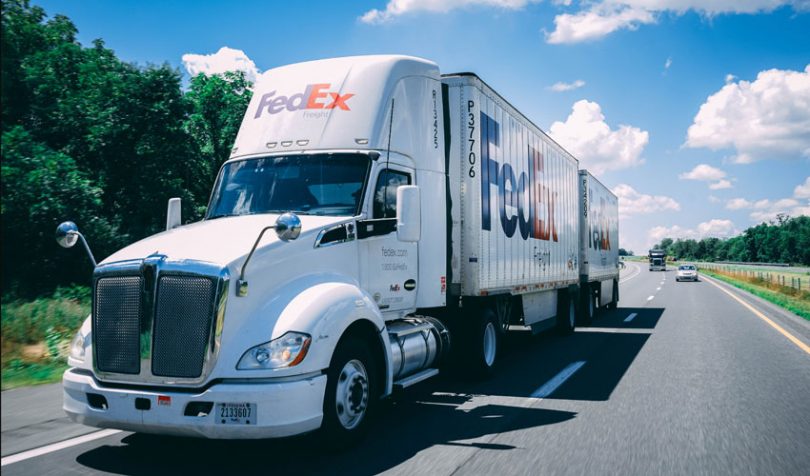Last year the Chairman and founder of FedEx, Frederick W. Smith, said that blockchain has “big, big implications in supply chain, transportation, and logistics.” So the question is what is FedEx working on? Ledger Insights spoke to Dale Chrystie, FedEx Business Fellow, who was recently elected as the first chair of Blockchain in Transport Alliance (BiTA) Standards Council.
Chrystie highlighted two areas of interest to FedEx, authenticity and peer-to-peer networking. The latter would involve improving communications between business partners for better and more efficient customer service. Although the technology needs to mature for peer-to-peer networking, Chrystie believes that “it’s going to be very disruptive to a lot of processes.”
The demand for authenticity
Traceability is a popular blockchain application. “We have a track and trace that is second to none in the world,” said Chrystie. “Blockchain doesn’t really help us much because, as I would say, ‘We know where your package is.’ However, the provenance, the authenticity of this is a layer that sits on top of that, and where those two come together is where we’re focusing our efforts.”
Global customs clearance is the area that Chrystie sees as a strong match between blockchain and FedEx. “We go to 200 plus countries and right now when we go from one country across a border to another, in many cases that item is called something different,” Chrystie explained. “People are speaking both literally and figuratively different languages, and that’s where authenticity is important.”
Provenance is also particularly important for certain types of products such as pharmaceuticals, medical devices, aircraft parts and additive manufacturing. Chrystie elaborated why it’s relevant for these particular use cases: “I can absolutely prove that this item came from you and it is authentic. It’s not inferior. It’s not counterfeit. In some cases, governmental agencies FDA [U.S. Food and Drug Administration] or FAA [Federal Aviation Administration] or others may be required in that. Where that is interesting or necessary or critical, I think this technology really jumps to the top very quickly.”
Apart from authenticity, peer-to-peer networking is the other blockchain feature that stands out.
Are you a middleman?
Chrystie spoke about the current ride-sharing apps which are dependent on a middleman and how in future blockchain’s peer-to-peer technology could be disruptive and enable a car and a passenger to be matched directly.
Ledger Insights pointed to some businesses in FedEx’s sector such as on-board couriers Airmule and Wings which manage excess capacity and in future could work as a distributed network which would take out the middleman.
“I think most companies are a middleman in some regards. And that’s why I think it’s so important for people to go in with their eyes wide open and really look at the technology and really look at themselves in the mirror and say ‘Am I a middleman and what value do I provide?’ And they should have a good answer to that,” said Chrystie.
“And their C-suite should be able to discuss that openly. Just to sit and wait for this technology to mature is probably not a good strategy.”
Chrystie continued, referring to Airmule and Wings: “So certainly, the companies that you’ve now mentioned are essentially managing excess capacity. There’s a different way to get from point A to point B.”
“And so we manage that pretty well, we handle millions of packages a day globally through more than 200 countries. We’re pretty good at managing capacity as well. And so where technology helps you better and better manage capacity or get final mile or first-mile delivery. We’re very interested in those examples.”
Where can we agree?
To reap the benefits of blockchain technology, Chrystie views the Promised Land as on the other side of the canyon. To get there requires “coopetition.”
“I look forward to people focusing on ‘Where can we agree?’- which is where we are at the Blockchain in Transport Alliance (BiTA) – and not ‘Where do we compete?’,” observed Chrystie.
“Businesses who are used to competing against each other are hopefully getting better and better at sitting side by side with each other and helping to build this thing out. Because it’s going to be a big wonderful place once we can build it, but it hasn’t been built yet, and none of us individually can do it on our own.”
One of the key products of coopetition needs to be a common language for data and processes standards. At the end of February, BiTA published its first two standards – one for tracking data and the other for location.
Chrystie was quite clear that those who choose not to adopt standards face the risk of being sidelined in a future business landscape. “You cannot create your own silo and have it be effective in a supply chain that’s global.”
So if the biggest challenge is working together, what are the other blockchain challenges?
A lack of maturity, which includes scalability and speed are two challenges, although progress is being made. Chrystie believes we’re already past the stage where people treat blockchain like magic dust. But he’s interested to see how fast it can mature.
Technology agnostic
One aspect that some see as part of the maturing process is for some applications to shift from private to public blockchains. For now, most enterprises see private permissioned blockchains as the way to go, as does Chrystie, particularly for certain types of goods such as pharmaceuticals. He has a hard time seeing the practicality of permissionless, but added the caveat of “in the short-term”.
FedEx is a member of two permissioned blockchain groups, the Enterprise Ethereum Alliance as well as Hyperledger.
Chrystie clarified that FedEx is technology agnostic. “Our customers are used to us providing them options and value, and we are certainly not going to paint them into a corner and say you must do the following.”
He also emphasized the importance of interoperability. “We believe that there will be a number of blockchains moving forward. And we’re going to have to be multilingual from that point of view so that these systems can speak,” said Chrystie.
The final question is when can we expect to see a blockchain announcement from FedEx? “We and a lot of others are working on things. And my sense is in 2019, 2020 there’s going to be a lot of announcements, a lot of tangible examples of where this goes.”






